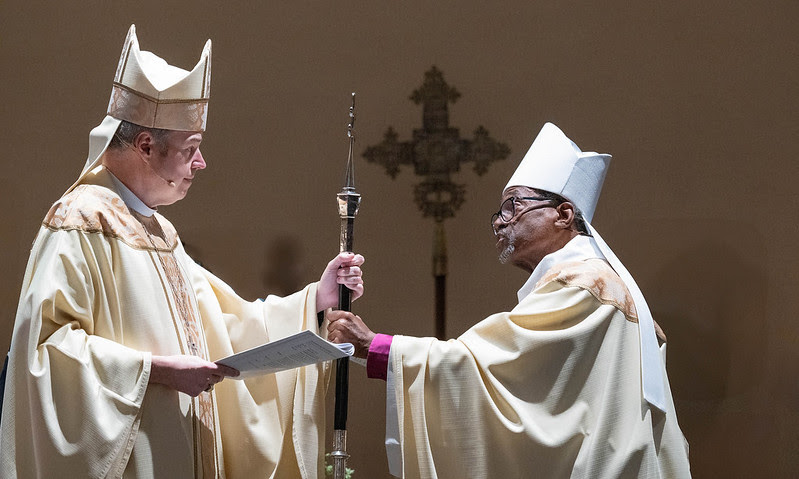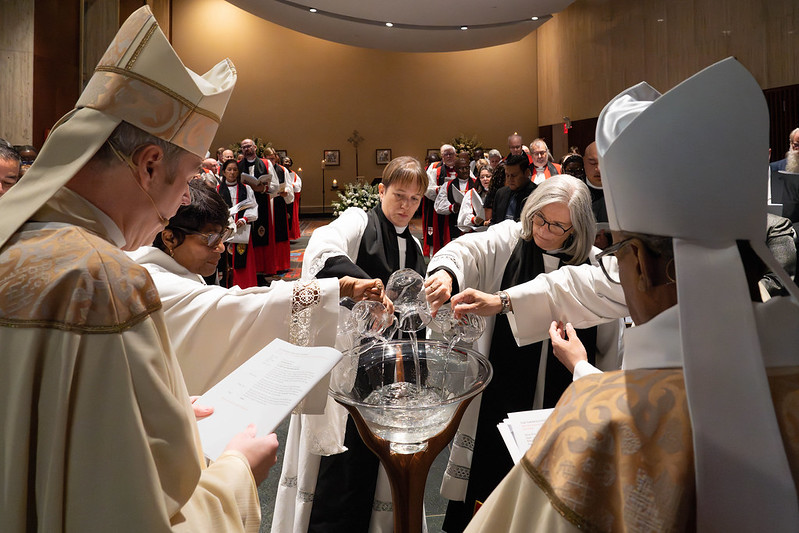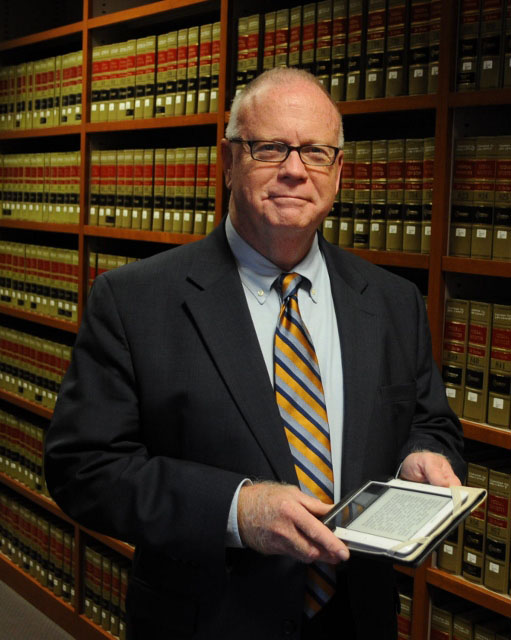
Presiding Bishop Sean Rowe receives the primatial staff from former Presiding Bishop Michael Curry on Nov. 2, 2024.
PHOTO CREDIT: David M. Rider/The Episcopal Church
Episcopalians worldwide gathered on November 2nd for a groundbreaking virtual investiture service of the Most Rev. Sean Rowe as the church’s 28th presiding bishop.
The service embraced diversity and showcased Rowe’s environmentally conscious approach by being livestreamed from New York City’s Chapel of Christ the Lord at The Episcopal Church Center at Presiding Bishop Rowe’s request. The virtual service and Rowe’s focus on unity and community engagement set the tone for his episcopacy.
Rowe said that during his nine-year term he will focus on ways the Church can better live into the teachings of Jesus: alleviating suffering, liberating captives, and repairing a broken world.
His sermon was based upon the Gospel passage John 11:32-44, in which Jesus raises Lazarus from the dead. Rowe emphasized the transformative power of faith, stating, “Every time we feed the hungry, care for the sick, and welcome the stranger, we are reaching for life in the face of death.”
Rowe also stressed that building the Kingdom of God is not a distant or abstract concept but a present reality that can be experienced and shared in the here and now.
“This work [is] the work of proclaiming in word and deed that Jesus’ resurrection in life, is the work to which God has called The Episcopal Church, now and always, as one church, together. Friends, the kingdom of God is near, right here, right now.”
Rowe said if the Church is to achieve that goal it must set aside divisions and discord over doctrine and that congregations, dioceses, and institutions must cease operating in isolation and function as one unified church.
“We’re not a collection of dioceses and institutions, a collection of ways of doing things. We are one church, one church in Jesus Christ. God has given us the ability to share our resources and talents and invest in ministry happening on the ground—ministry in which every day faithful people, Christians all around the world, are building communities, advocating for justice, and saving lives. Your ministries and your communities where you are doing the work of unbinding, of liberating, of being the risen body of Christ in the world.”
Rowe called for more collaborative ministries in the Church.
“The days are over, if they ever existed, that dioceses and congregations and institutions of our church can just go it alone and do it their own way. For we must acknowledge our mutual interdependence, our need to do ministry together, to share what we have and to sustain one another. Especially now in this badly hurting world, we need to become one church.”
During the service, Rowe reflected his priorities by encouraging that donations go to Episcopal Migration Ministries.
Rowe’s immediate predecessors played significant roles in his investiture service. 27th Presiding Bishop Michael Curry presided over the initial proceedings, while 26th Presiding Bishop Katharine Jefferts Schori joined Episcopal youth representative Maya Lattimer in offering prayers for Rowe.
The ceremony featured elements representing the multinational Episcopal Church, such as water collected from various provinces, prayers offered in multiple languages, and a roll call with video greetings from numerous dioceses.
The investiture service’s Litany for the Mission of the Church featured 15 intercessors who shared prayers in the following languages: Eastern Shoshone, Mandarin, Juba, German, Arabic, Hebrew, French, Anishinaabemowin, Spanish, English, French, and Xhosa.

Formerly bishop of the Episcopal Dioceses of Northwestern Pennsylvania and Western New York, Rowe was elected and confirmed as the next presiding bishop at the Church’s 81st General Convention on June 26.
In addition to being the Church’s chief pastor Rowe will also serve as president and executive officer of the Domestic and Foreign Missionary Society (the church’s corporate body) and chair the church’s Executive Council.
About The Episcopal Church
The Episcopal Church is part of the worldwide Anglican Communion. The Episcopal Church is comprised of a diverse network of 109 dioceses across the United States and beyond including Haiti, Honduras, Colombia, Venezuela, Ecuador, Taiwan, Austria, Belgium, France, Germany, Italy, Switzerland, and the Caribbean.
Diversity and inclusion are well-known hallmarks of the Episcopal Church, which has made considerable efforts to foster reconciliation, address issues of racial and LGBTQ+ justice, and celebrate the multicultural diversity that characterizes its membership.
But some of these efforts have challenged the fabric of the church. Presiding bishops Shori’s and Curry’s tenures were marked by legal battles with renegade bishops and dioceses seeking to leave the Church over ordaining gay priests and bishops and allowing same-sex marriages.
Those tensions are reflected in shrinking membership from 2.3 million in 2000 to 1.4 million in 2022.
The most reliable barometer of The Episcopal Church’s health is annual parochial reports compiled by all dioceses.
The most recent available data show that from 2018-2022 Episcopal Church membership decline slowed from 23 percent over the past decade to 15 percent over the last five years. Sunday worship attendance had a significant decline during the COVID-19 pandemic, but there are signs of recovery in data showing average Sunday attendance increasing from 293,000 in 2021 to 373,000 in 2022.
Financially, the Episcopal Church maintained stability in its income and expenses over recent years. Notably, 2022 reports show a modest upward trend in funds collected through offerings during services and pledges.
About The Diocese of Atlanta
The Diocese of Atlanta, one of the largest in the Church, is addressing challenges facing the wider Church by prioritizing congregational vitality and spiritual growth.
In a 2023 video report, Canon for Congregational Vitality Sally Ulrey said the decline in attendance across The Episcopal Church is reflected in the Diocese of Atlanta. But she said the Atlanta Diocese remains a robust and well-resourced community with higher median attendance than the national average.
Emphasizing the importance of understanding evolving attendance trends, Ulrey noted that regular church attendance now often involves participation once every four to six weeks. To remain relevant amidst societal changes such as decreased trust in institutions, rising secularism, and growing loneliness, Ulrey said the Diocese is focusing on fostering authentic community and meaningful relationships.
It is also working to become a more collaborative, lay-led, and resource-sharing institution by encouraging experimentation and developing new approaches to better serve current societal needs. Support for these efforts includes providing resources for strategic planning, leadership development, and lay ministry formation programs that empower the laity to play more prominent roles in the church’s future.
Ulrey expressed hope, saying that the Diocese’s core mission will continue through dedicated individuals committed to the transformative power of The Gospel.
Ulrey said the reason she is optimistic about the future is because the Diocese is leveraging its existing resources, fostering community relationships, and embracing a more lay-focused ministry to promote vitality and spiritual growth at its 110 worshiping locations.
The Episcopal Church Office of Public Affairs contributed to this article.

